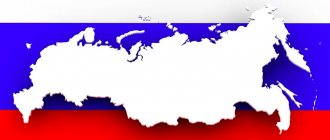From the history of language
Before writing an essay on the topic of the Russian language, you should definitely touch on the history of its origin and development.
Our country saw a lot before its culture was formed, huge cities were built and a great language appeared. Before its current state, the Russian language has gone through many changes. Its history is very rich, but there are starting points and key moments that make it possible to see how it was formed and developed. The Russian language arose a long time ago, even before our era, before the appearance of the Proto-Slavic language. It was divided into three parts: southern, eastern and western. The Russian language, which was then Old Russian, arose from the East Slavic branch. It was he who was the language of Kievan Rus. Later, Belarusian, Russian and Ukrainian evolved from the Old Russian language. Old Russian has sunk into oblivion, and the ancestor of the modern Russian language—the northeastern dialect—began to take shape. In the 17th century, it was finally formed, writing began to develop, the vocabulary began to expand, and rules arose. It was then that church literature developed. But only in the 19th century the language was divided into ecclesiastical and artistic, and secular literature appeared. New words, borrowed mainly from the French language, were gradually introduced. Terms appeared with the development of new areas of activity. To avoid excessive contamination of the Russian language with foreign words, Peter I awarded it state status. The beginning of the 20th century, along with the development of science, was marked by a new flow of foreign words, mainly English and German. The Church tried to fight this, but to no avail: borrowings were tightly woven into the vocabulary of the Russian language.
"The wealth of the Russian language."
The Russian language is considered one of the most complex and rich languages in the world. It has a long history of development. However, like Russia itself.
All the greatest writers and poets of our country also entered the history of the Russian language. After all, it was they who helped him develop, making changes there, transforming him. You can easily name a number of such names. This also applies to his theory of the “three calms”. This also applies to his teaching on elegant “salon” speech. This, of course, also brought great changes to the Russian literary language of the 19th century. And in general, all talented Russian writers and poets influenced the Russian language through their creations.
Language is not a random collection of letters and words. It represents a system. We see the richness of the Russian language at all its levels, from sounds to complex sentences and entire texts. For example, in Russian, one of the few languages, there is a division of verbs into persons. This is not found in English and many other languages of the world. In the phonetics of the Russian language, there are several divisions of sounds: voiced, voiceless, sonorant, only voiced and only voiceless, soft and hard, only soft and only hard sounds. In addition, there are also letters that do not denote any sounds (for example, soft and hard signs), as well as letters that denote several sounds at once in certain positions (vowels E, Yo, Yu, Ya).
The vocabulary of the Russian language contains enormous wealth. There are many words in it to denote not only feelings or actions, but even their shades. In the Russian language there are huge numbers of synonyms, antonyms, paronyms, and homonyms. Only a Russian man can look his beloved in the eyes, admire the eyes of the goddess, spit in the eyes of his neighbor and threaten to gouge out the eyes of his enemy.
The vocabulary of the Russian language has developed so much that it contains many branches. These are professional, youth jargons; various secret languages (for example, the language of the underworld) and so on. Many Russian and foreign scientists are studying these sublanguages. They all admire the richness of our language, its inexhaustible possibilities.
In the modern world, we speak and write using language. Therefore, we have spoken and written language. The written, or literary, language is the same for everyone. And there are a great many spoken languages. And Russian people cannot always easily understand each other.
For example, residents of villages and small towns (especially older people) use words and expressions that are unfamiliar or completely unfamiliar to residents of megacities. And vice versa.
This happens because in the Russian language there are dialects, words, expressions and pronunciation features that are unique only to residents of a particular area. It is known that in the south of Russia a snake is called a “royalty”, and an izba is called a “hut”. An excellent example of dialect words was given to us by S. Yesenin in his poem “In the Hut”:
It smells like loose hogweed;
There's kvass in the bowl at the doorstep,
Over chiseled stoves
Cockroaches crawl into the groove.
Only in this quatrain we find two dialect words (drachenami, dezhka) and two words associated with the designation of village life (turned stoves, groove). The remaining stanzas of this poem are also full of colorful dialect words. With this work, Yesenin once again proved the richness of not only literary, but also folk, “village” language.
It is known that Russian is one of the most difficult languages to learn. All foreigners who want to master our language talk about this. It is difficult for them to grasp the entire vocabulary of the Russian language, master the subtleties of grammatical structure, and learn to construct sentences correctly. But, nevertheless, the number of foreigners studying our language is not decreasing. This has a lot to do with our great classical literature. Residents of other countries strive to read the works of Pushkin, Tolstoy, Dostoevsky in the original language.
The native language is part of the national culture and a very important part of every person. Undoubtedly, you need to know and take care of your native language. This is as important as knowing and respecting the languages of other peoples:
What makes it special?
Even in a small essay about the extraordinary Russian language, it is necessary to emphasize its features.
It is very different from others:
- His words have inflections, that is, endings that express grammatical meaning: they indicate the gender, number and case of the word. It turns out that the word has both lexical (the meaning of the word) and grammatical meaning at the same time.
- Words have an initial form. For example, for verbs it is the infinitive, and for adjectives it is the nominative case, singular and masculine. Let’s say that for the verb “I run” the initial form is the word “run”, and for “beautiful” - “beautiful”.
- There are many parts of speech in the Russian language, there are also independent ones (they have a lexical meaning and talk about an object or its actions, and auxiliary ones, which help express grammatical meaning and add semantic nuances).
- The phonetic (sound) system has forty-three phonemes. Sounds are presented in the form of variants, that is, consonants, if possible, are presented in soft and hard form ([m]-[m`]).
- Vowel sounds, especially [a] and [o], can change during speech depending on their position. The strongest, where the sound is clearly audible - under the accent. The further away from the impact sound, the weaker the position.
Essay on the topic of the Russian language in the modern world
We see that a language is constantly changing, but this is how it should be if it is used by a large number of speakers. After all, if a language does not undergo changes, it dies.
In terms of the number of native speakers, Russian occupies an honorable third place, second only to English and Chinese. Every country has Russian-speaking representatives, that is, Russian speech is heard in every corner of the world.
In an essay about the Russian language, mention that it is official in Russia. It is also spoken by the majority of residents of the states that were once part of the CIS. True, after the collapse of the Union, states refused to use the Russian language, prohibited teaching children in it, and gradually the number of people speaking it decreased threefold.
Meanings of language for national culture
People have been trying to unravel the mystery of language since ancient times. Some believe that language is a gift from God, others believe that speech is a product of human evolution, and others believe that language is a gift from extraterrestrial civilizations. But, nevertheless, language plays a vital role in the life of society.
Language is the keeper of the spiritual values of the people, their history. Often, with the help of language and its various historical forms, a person can understand the full depth of his past, his history. Historicisms and archaisms contain the life, customs, and traditions of the peoples of the past. It is with the help of historical alphabets, words and grammar that linguistic scientists try to unravel the mysteries of bygone generations: how they lived, what interested them, what they did. After all, every word contains not only sounds, but also a special meaning, having learned which, you can discover endless knowledge about your homeland, people, and history. Thus, history always leaves its mark on language; language is one of the ways of knowing history.
A person’s thoughts can be expressed in drawings, in drawings, in dance, in a person’s actions. However, all these actions find their expression only in language - otherwise the thought cannot be seen or heard. Thus, language is the embodiment of human thoughts.
Man is a biosocial being, therefore he is capable of developing normally only in society. But for a conscious life in society, communication with other people is necessary. Expressions of emotions and hand gestures alone are not enough here. In order for thoughts to become not only personal, but also public property, language is needed, otherwise communication is almost impossible. Even the simplest human feelings (friendship, love, care, admiration, fear, etc.) always find their verbal expression. Thus, language is so far the only reasonable way of communication and interaction between people.
National significance in an essay about the Russian language
What is the official language? The one on which laws and decrees are created, the Constitution is written, important papers are drawn up, and trials are conducted. There is even a “Law on the Russian Language” - an official document that prescribes reference books, dictionaries, reference books that contain the norms of the Russian language. And in 2011, Dmitry Medvedev approved Russian Language Day, which falls on June 6 - the birthday of the world-famous great Russian writer and poet Alexander Sergeevich Pushkin.
Essay on the topic of the rich Russian language
Essay No. 1 Our Russian language is rich
Many people do not even think that its language is considered the richest. Why Russian? The answer is very simple, the Russian language is the only language in the world in which words can be replenished again and again. Our language and our culture are replenished from many expressions and invented words, because much that was popular with our grandparents passes into our colloquial vocabulary, and our grandchildren will also speak in our phrases.
The Russian language is very difficult, but this does not make it any less attractive. Many writers have said that you can conduct any conversation in Russian: a declaration of love, communication with an enemy, a friendly conversation, because it can convey all feelings and emotions better than any other language. The main thing is to learn to be a literate person; you shouldn’t shout to the whole world that it’s too complicated and that they’ve come up with too many stupid rules.
It should be remembered that the language we speak is a gift from our ancestors and not a learning of the language - this is tantamount to forgetting about our relatives, not accepting their culture, becoming a stranger among our own. It is especially sad to hear this from the small, still growing generation. They don’t yet know that by knowing it, you can discover a new world for yourself. in the Russian language there are many words that are synonymous, so composing poetry will not be difficult for anyone; choosing the right word, its meaning will not change. It’s very fun to learn new words, because a word that means one object or action can be associated by sound with a completely different object.
Once you fall in love with a language, it will open up many opportunities for you, I have verified all this from my personal experience. After reading a large number of books, you no longer remember the rules, and you write sentences freely without making any mistakes. This is what it means - a rich Russian language. So it’s better to take care of your language from a young age.
Essay on reasoning The Russian language is unusually rich, grade 6
We often hear the statement that the Russian language is very rich. But is it? Let's figure it out.
The first thing that shocks any foreigner about the language is the number of synonyms. For example, the word “beautiful” can be occupied by words such as “stunning”, “beautiful”, “good”, “beautiful”, “attractive” or “delightful”. There is hardly a word for which a suitable replacement cannot be found. This, of course, speaks of the splendor and diversity of the Russian language.
Also, unlike, for example, English, in Russian there is no correct construction of interrogative sentences. That is, you can only use intonation when constructing a question. Moving a punctuation mark, using various suffixes and prefixes, changing the order of words can also radically change the meaning of a sentence. The number of means of expression is also striking. When reading any work, you encounter many epithets, personifications and metaphors.
Don't forget that the average person uses only one-fifth of the words in the entire language. This, in turn, also speaks of its vastness and immensity.
In conclusion, I would like to say that such a rich and amazing language must not only be protected, but also be able to use it. To do this, you should use as few foreign words as possible and, of course, read classical literature to expand your vocabulary.
Essay No. 3 The Russian language is unusually (extraordinarily) rich essay-reasoning
What could be more expensive, more valuable and more vulnerable than our native language; the language we speak? Our Russian language. There are a great many countries, peoples, languages, people in the world. But I speak Russian, and I write in it, I think, since I am a Russian person. The Russian language is rightfully considered one of the most beautiful, melodic, sophisticated and musical languages in the world. It is not for nothing that such great writers, poets, musicians as Pushkin, Blok, Tchaikovsky wrote their works in Russian. And what wonderful poems the great poetesses gave us: Akhmatova, Tsvetaeva, Teffi and many others.
Just remember how many great writers wrote in Russian: Lermontov, Bulgakov, Bunin, Solzhenitsyn, Pelevin, Kuprin, Pasternak. But what about Lomonosov with his great theory of three calms? This theory laid the foundation for the division of our language into ranks; divided it into low, medium and high style. The language has become even more diverse and unique because of this. Thanks to its versatility, the Russian language always remains unique, making a person’s speech expressive and eloquent.
The Russian language is our gift, a gift, and the creation of the Almighty. The Russian language is so different, both an intellectual and an ordinary man from the people can speak it, and this will not make the language paler, but on the contrary, it will sparkle with all the forms of its greatness. For me, the most beautiful language in the world is Russian.
More than 145 million people on earth consider Russian their native language. Also, Russian is the official language in Russia and in several countries of the former USSR. Russian is also spoken outside our country; it is taught in foreign universities: in America, Great Britain, France, Germany, Luxembourg. Interethnic agreements are concluded in Russian and international meetings are held. Many students from other countries try to visit our country to hear such a native and beautiful Russian language. As one great man once said, I’ll paraphrase, “there are many languages in the world, all of them were created for different things. And the Russian language was created for life and reflection.” I'm not arguing that all languages deserve respect. But most of all, every person should love and respect his native language, the language in which he speaks from birth, in which he thinks and makes decisions.
And how can we not be proud of our native language after this? We should be proud of him. This is our direct duty and honor. I am proud that I speak and write in Russian. I believe that every citizen of our country should value and love their native language; do not pollute it with foreign words, ugly expressions and dialects; incorrect phonetics. Monitor your speech, treat your language with respect and care. Speak clearly, brightly, sophisticatedly, as the Russian language allows us to do. Love your language - it is our great Russian language. The task of us, people who speak Russian, is to preserve and enhance the beauty of the Russian language for future generations. This is our goal for many years and centuries to come.
The Russian language is rich and picturesque. It is powerful and picturesque.
Russian literature
The Russian language entered other countries with the help of our great writers. Many foreign universities study Russian literature. Dostoevsky, Tolstoy, and Pushkin are especially valued among amateurs.
For a very long time, Russian literature was separated from foreign readers by a language barrier. The translation that went abroad was not of the best quality.
The first work published in France was Leo Nikolaevich Tolstoy's novel War and Peace. Turgenev, who promoted Russian literature in the West, helped in this.
And from the second half of the eighties of the 19th century, books by Leo Tolstoy, Fyodor Dostoevsky, Ivan Turgenev, Ivan Goncharov were already translated into foreign languages. Critics urged authors to learn from writers from Russia. Although our literature was analyzed very one-sidedly: seeing “human suffering” in the books, social problems and ideological richness were completely ignored by critics.
Problems raised by Russian literature
Even in a mini-essay about the Russian language, it is necessary to mention what it brought to world literature.
Foreign writers who began literary activity in the late 19th and early 20th centuries were formed precisely under the influence of Russian literature.
Our literature raised the problems of Russian life and connected them with the history and experience of mankind. She pushed foreigners to think about a person’s personality and his responsibility, about morality, about moral duty to himself and society. It was Russian literature that influenced the development of realism.
Maxim Gorky, who entered world literature, influenced the consciousness of society not only as a writer, but also as a public figure and organizer. His revolutionary spirit was close to many writers. But Vladimir Mayakovsky entered literature as an innovator who brought new forms into culture.
Both Soviet and modern literature are highly valued by foreign readers. This means that we have proven how powerful the Russian word is.







